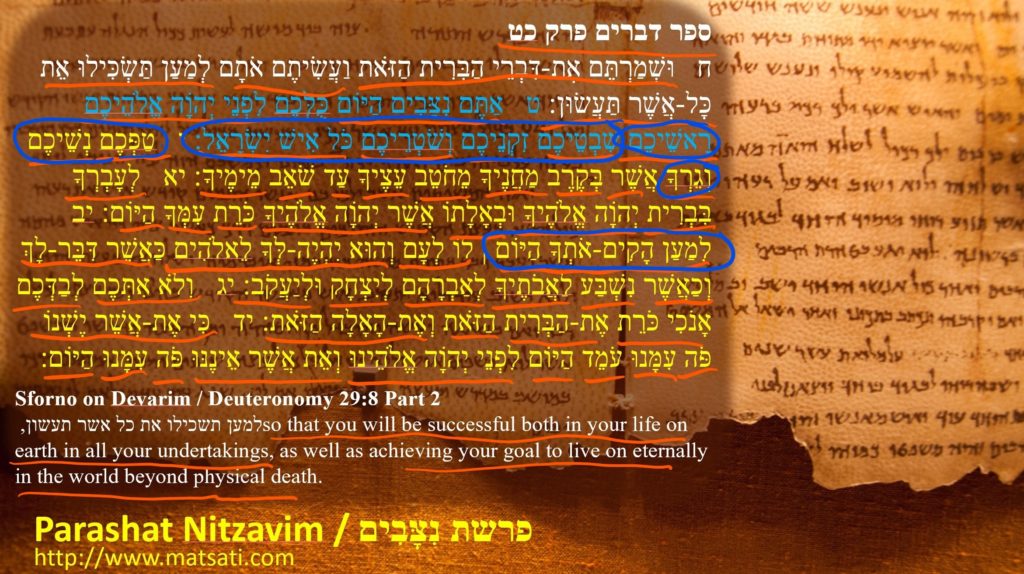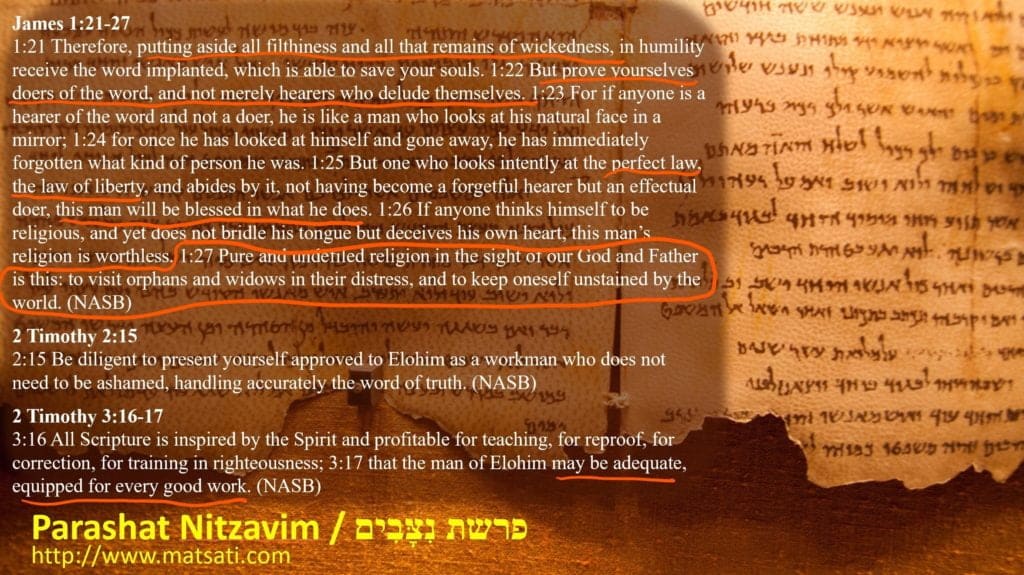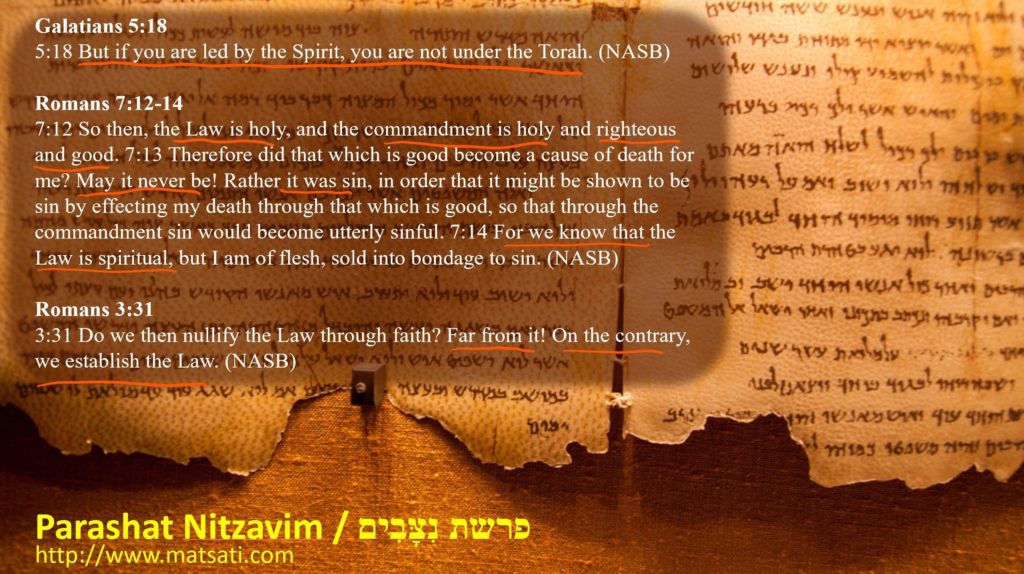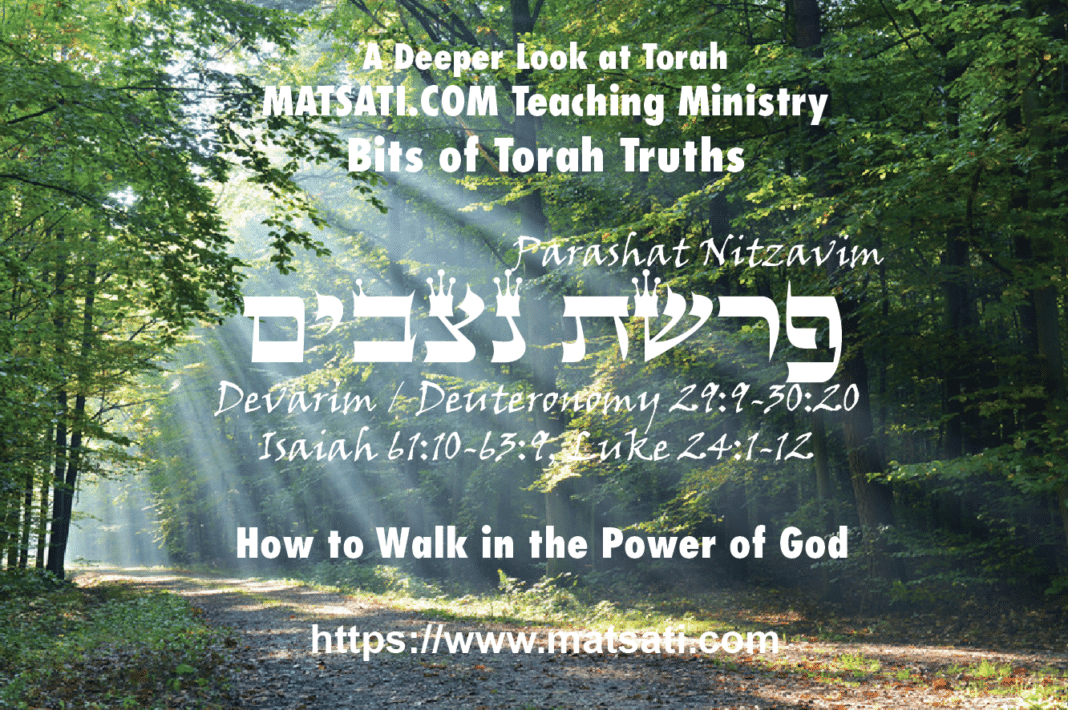This week’s Torah Portion, there is a slight discrepancy in the verse numbering when comparing the Masoretic text to the English bibles. The Masoretic text opens Parashat Nitzavim with Devarim / Deuteronomy 29:9 whereas the English translation opens in Devarim / Deuteronomy 29:8 (shifted by one verse when comparing the original text). Moshe goes on to talk about the restoration of Israel as promised as Moshe speaks prophetically about Israel sinning against God. (Devarim / Deuteronomy 30:1-14) Then Moshe speaks about choosing life by walking in God’s Ways as opposed to walking in darkness (lies, untruths, sin, rebellion, Devarim / Deuteronomy 30:15-20). Looking at the English translation, Moshe opens saying וּשְׁמַרְתֶּם אֶת-דִּבְרֵי הַבְּרִית הַזֹּאת וַעֲשִֹיתֶם אֹתָם לְמַעַן תַּשְֹכִּילוּ אֵת כָּל-אֲשֶׁר תַּעֲשֹוּן: “So you will keep the words of this covenant and do them, in order that you may be successful in everything that you do” ( Devarim / Deuteronomy 29:9) suggesting that keeping Torah one will be very successful! The word תַּשְֹכִּילוּ means “prosper.” This word is written in the hifil verbal pattern, causative, and refers to the object תַּעֲשֹוּן “you do.” This is the point as the text states לְמַעַן תַּשְֹכִּילוּ אֵת כָּל-אֲשֶׁר תַּעֲשֹוּן “that you may make to prosper all that you do.” We note the same word used according to 1 Samuel 18:14, וַיְהִ֥י דָוִ֛ד לְכָל־דָּרְכָ֖ו מַשְׂכִּ֑יל וַֽיהוָ֖ה עִמּֽוֹ׃ “David has great success in all his ways because God was with him.” The word מַשְׂכִּ֑יל means to prosper or have success. The root word שכל means “intelligence.” (Ibn Ezra on Devarim / Deuteronomy 29:8 Part 1) We note the significance of this statement, as the one who walks in the ways of God in truth, righteousness, and holiness, will prosper because he is walking in the light, is able to see where he is going, discern what is happening, and not be deceived by the darkness of this world. It is interesting how Sforno draws out an eternal perspective in his commentary saying the following.

Sforno on Devarim / Deuteronomy 29:8 Part 2
למען תשכילו את כל אשר תעשון, so that you will be successful both in your life on earth in all your undertakings, as well as achieving your goal to live on eternally in the world beyond physical death.
According to Sforno, the way we live our lives is connected not just to being successful here on earth, but also as affecting our relationship with God, and the Olam Haba. The idea is this world is the training ground for life in the world to come when we will be living with the Lord.
Moshe continues saying, ט אַתֶּם נִצָּבִים הַיּוֹם כֻּלְּכֶם לִפְנֵי יְהוָֹה אֱלֹהֵיכֶם רָאשֵׁיכֶם שִׁבְטֵיכֶם זִקְנֵיכֶם וְשֹׁטְרֵיכֶם כֹּל אִישׁ יִשְֹרָאֵל: י טַפְּכֶם נְשֵׁיכֶם וְגֵרְךָ אֲשֶׁר בְּקֶרֶב מַחֲנֶיךָ מֵחֹטֵב עֵצֶיךָ עַד שֹׁאֵב מֵימֶיךָ: יא לְעָבְרְךָ בִּבְרִית יְהוָֹה אֱלֹהֶיךָ וּבְאָלָתוֹ אֲשֶׁר יְהוָֹה אֱלֹהֶיךָ כֹּרֵת עִמְּךָ הַיּוֹם: [שני] יב לְמַעַן הָקִים-אֹתְךָ הַיּוֹם | לוֹ לְעָם וְהוּא יִהְיֶה-לְּךָ לֵאלֹהִים כַּאֲשֶׁר דִּבֶּר-לָךְ וְכַאֲשֶׁר נִשְׁבַּע לַאֲבֹתֶיךָ לְאַבְרָהָם לְיִצְחָק וּלְיַעֲקֹב: יג וְלֹא אִתְּכֶם לְבַדְּכֶם אָנֹכִי כֹּרֵת אֶת-הַבְּרִית הַזֹּאת וְאֶת-הָאָלָה הַזֹּאת: יד כִּי אֶת-אֲשֶׁר יֶשְׁנוֹ פֹּה עִמָּנוּ עֹמֵד הַיּוֹם לִפְנֵי יְהוָֹה אֱלֹהֵינוּ וְאֵת אֲשֶׁר אֵינֶנּוּ פֹּה עִמָּנוּ הַיּוֹם: 10 “You stand today, all of you, before the Lord your God: your heads, your tribes, your elders and your officers, that is, all the men of Israel, 11 your little ones, your wives, and the stranger who is within your camps, from the one who gathers your firewood to the one who draws your water, 12 so that you may enter into the covenant with the Lord your God, and into His oath which the Lord your God is making with you today, 13 in order that He may establish you today as His people, and that He may be your God, just as He spoke to you and as He swore to your fathers, to Abraham, Isaac, and Jacob. 14 “Now it is not with you alone that I am making this covenant and this oath, 15 but both with those who stand here with us today in the presence of the Lord our God, and with those who are not with us here today (NASB) Moshe speaks of all of Israel standing before God (אַתֶּם נִצָּבִים הַיּוֹם כֻּלְּכֶם לִפְנֵי יְהוָֹה אֱלֹהֵיכֶם רָאשֵׁיכֶם שִׁבְטֵיכֶם זִקְנֵיכֶם וְשֹׁטְרֵיכֶם כֹּל אִישׁ יִשְֹרָאֵל) but he doesn’t just mention Israel as we read the following, י טַפְּכֶם נְשֵׁיכֶם וְגֵרְךָ אֲשֶׁר בְּקֶרֶב מַחֲנֶיךָ מֵחֹטֵב עֵצֶיךָ עַד שֹׁאֵב מֵימֶיךָ “your little ones, your wives, and the stranger who is within your camps, from the one who gathers your firewood to the one who draws your water.” Remember those who were conscripted to carry firewood for the Israelites. These were the Gibeonites. The account where Gibeon and its people deceived Joshua by disguising themselves and pretending to live at a far distance. They were able to make a covenant with them that they would not kill them. This story is preserved in chapter 9 of the Book of Joshua. Note something significant here: according to these scriptures, both Jew and Gentile are standing before God this day.
The verses we are looking at for this week are from Devarim / Deuteronomy 29:9-21.
ספר דברים פרק כט
ח וּשְׁמַרְתֶּם אֶת-דִּבְרֵי הַבְּרִית הַזֹּאת וַעֲשִֹיתֶם אֹתָם לְמַעַן תַּשְֹכִּילוּ אֵת כָּל-אֲשֶׁר תַּעֲשֹוּן: פ פ פ [פרשת נצבים] ט אַתֶּם נִצָּבִים הַיּוֹם כֻּלְּכֶם לִפְנֵי יְהוָֹה אֱלֹהֵיכֶם רָאשֵׁיכֶם שִׁבְטֵיכֶם זִקְנֵיכֶם וְשֹׁטְרֵיכֶם כֹּל אִישׁ יִשְֹרָאֵל: י טַפְּכֶם נְשֵׁיכֶם וְגֵרְךָ אֲשֶׁר בְּקֶרֶב מַחֲנֶיךָ מֵחֹטֵב עֵצֶיךָ עַד שֹׁאֵב מֵימֶיךָ: יא לְעָבְרְךָ בִּבְרִית יְהוָֹה אֱלֹהֶיךָ וּבְאָלָתוֹ אֲשֶׁר יְהוָֹה אֱלֹהֶיךָ כֹּרֵת עִמְּךָ הַיּוֹם: [שני] יב לְמַעַן הָקִים-אֹתְךָ הַיּוֹם | לוֹ לְעָם וְהוּא יִהְיֶה-לְּךָ לֵאלֹהִים כַּאֲשֶׁר דִּבֶּר-לָךְ וְכַאֲשֶׁר נִשְׁבַּע לַאֲבֹתֶיךָ לְאַבְרָהָם לְיִצְחָק וּלְיַעֲקֹב: יג וְלֹא אִתְּכֶם לְבַדְּכֶם אָנֹכִי כֹּרֵת אֶת-הַבְּרִית הַזֹּאת וְאֶת-הָאָלָה הַזֹּאת: יד כִּי אֶת-אֲשֶׁר יֶשְׁנוֹ פֹּה עִמָּנוּ עֹמֵד הַיּוֹם לִפְנֵי יְהוָֹה אֱלֹהֵינוּ וְאֵת אֲשֶׁר אֵינֶנּוּ פֹּה עִמָּנוּ הַיּוֹם: [שלישי] טו כִּי-אַתֶּם יְדַעְתֶּם אֵת אֲשֶׁר-יָשַׁבְנוּ בְּאֶרֶץ מִצְרָיִם וְאֵת אֲשֶׁר-עָבַרְנוּ בְּקֶרֶב הַגּוֹיִם אֲשֶׁר עֲבַרְתֶּם: טז וַתִּרְאוּ אֶת-שִׁקּוּצֵיהֶם וְאֵת גִּלֻּלֵיהֶם עֵץ וָאֶבֶן כֶּסֶף וְזָהָב אֲשֶׁר עִמָּהֶם: יז פֶּן-יֵשׁ בָּכֶם אִישׁ אוֹ-אִשָּׁה אוֹ מִשְׁפָּחָה אוֹ-שֵׁבֶט אֲשֶׁר לְבָבוֹ פֹנֶה הַיּוֹם מֵעִם יְהוָֹה אֱלֹהֵינוּ לָלֶכֶת לַעֲבֹד אֶת-אֱלֹהֵי הַגּוֹיִם הָהֵם פֶּן-יֵשׁ בָּכֶם שֹׁרֶשׁ פֹּרֶה רֹאשׁ וְלַעֲנָה: יח וְהָיָה בְּשָׁמְעוֹ אֶת-דִּבְרֵי הָאָלָה הַזֹּאת וְהִתְבָּרֵךְ בִּלְבָבוֹ לֵאמֹר שָׁלוֹם יִהְיֶה-לִּי כִּי בִּשְׁרִרוּת לִבִּי אֵלֵךְ לְמַעַן סְפוֹת הָרָוָה אֶת-הַצְּמֵאָה: יט לֹא-יֹאבֶה יְהֹוָה סְלֹחַ לוֹ כִּי אָז יֶעְשַׁן אַף-יְהוָֹה וְקִנְאָתוֹ בָּאִישׁ הַהוּא וְרָבְצָה בּוֹ כָּל-הָאָלָה הַכְּתוּבָה בַּסֵּפֶר הַזֶּה וּמָחָה יְהוָֹה אֶת-שְׁמוֹ מִתַּחַת הַשָּׁמָיִם: כ וְהִבְדִּילוֹ יְהוָֹה לְרָעָה מִכֹּל שִׁבְטֵי יִשְֹרָאֵל כְּכֹל אָלוֹת הַבְּרִית הַכְּתוּבָה בְּסֵפֶר הַתּוֹרָה הַזֶּה:
Devarim / Deuteronomy 29:9-21
9 So you will keep the words of this covenant and do them, in order that you may be successful in everything that you DO. 10 “You stand today, all of you, before the Lord your God: your heads, your tribes, your elders and your officers, that is, all the men of Israel, 11 your little ones, your wives, and the stranger who is within your camps, from the one who gathers your firewood to the one who draws your water, 12 so that you may enter into the covenant with the Lord your God, and into His oath which the Lord your God is making with you today, 13 in order that He may establish you today as His people, and that He may be your God, just as He spoke to you and as He swore to your fathers, to Abraham, Isaac, and Jacob. 14 “Now it is not with you alone that I am making this covenant and this oath, 15 but both with those who stand here with us today in the presence of the Lord our God, and with those who are not with us here today 16 (for you know how we lived in the land of Egypt, and how we passed through the midst of the nations through which you passed; 17 moreover, you have seen their abominations and their idols made of wood and stone, silver and gold, which they had with them); 18 so that there will not be among you a man or woman, or family or tribe, whose heart turns away today from the Lord our God, to go to serve the gods of those nations; that there will not be among you a root bearing poisonous fruit and wormwood. 19 And it shall be when he hears the words of this curse, that he will consider himself fortunate in his heart, saying, ‘I will do well though I walk in the stubbornness of my heart in order to destroy the watered land along with the dry.’ 20 The Lord will not be willing to forgive him, but rather the anger of the Lord and His wrath will burn against that person, and every curse that is written in this book will lie upon him, and the Lord will wipe out his name from under heaven. 21 Then the Lord will single him out for disaster from all the tribes of Israel, in accordance with all the curses of the covenant which is written in this Book of the Law. (NASB)
In the opening passages of this week’s Torah portion Moshe writes some very significant statements. He specifically states the following, ט אַתֶּם נִצָּבִים הַיּוֹם כֻּלְּכֶם לִפְנֵי יְהוָֹה אֱלֹהֵיכֶם רָאשֵׁיכֶם שִׁבְטֵיכֶם זִקְנֵיכֶם וְשֹׁטְרֵיכֶם כֹּל אִישׁ יִשְֹרָאֵל: י טַפְּכֶם נְשֵׁיכֶם וְגֵרְךָ אֲשֶׁר בְּקֶרֶב מַחֲנֶיךָ מֵחֹטֵב עֵצֶיךָ עַד שֹׁאֵב מֵימֶיךָ: יא לְעָבְרְךָ בִּבְרִית יְהוָֹה אֱלֹהֶיךָ וּבְאָלָתוֹ אֲשֶׁר יְהוָֹה אֱלֹהֶיךָ כֹּרֵת עִמְּךָ הַיּוֹם: [שני] יב לְמַעַן הָקִים-אֹתְךָ הַיּוֹם | לוֹ לְעָם וְהוּא יִהְיֶה-לְּךָ לֵאלֹהִים כַּאֲשֶׁר דִּבֶּר-לָךְ וְכַאֲשֶׁר נִשְׁבַּע לַאֲבֹתֶיךָ לְאַבְרָהָם לְיִצְחָק וּלְיַעֲקֹב: יג וְלֹא אִתְּכֶם לְבַדְּכֶם אָנֹכִי כֹּרֵת אֶת-הַבְּרִית הַזֹּאת וְאֶת-הָאָלָה הַזֹּאת: יד כִּי אֶת-אֲשֶׁר יֶשְׁנוֹ פֹּה עִמָּנוּ עֹמֵד הַיּוֹם לִפְנֵי יְהוָֹה אֱלֹהֵינוּ וְאֵת אֲשֶׁר אֵינֶנּוּ פֹּה עִמָּנוּ הַיּוֹם: 29:10 “You stand today, all of you, before the Lord your God: your heads, your tribes, your elders and your officers, that is, all the men of Israel, 11 your little ones, your wives, and the stranger who is within your camps, from the one who gathers your firewood to the one who draws your water, 12 so that you may enter into the covenant with the Lord your God, and into His oath which the Lord your God is making with you today, 13 in order that He may establish you today as His people, and that He may be your God, just as He spoke to you and as He swore to your fathers, to Abraham, Isaac, and Jacob. 14 “Now it is not with you alone that I am making this covenant and this oath, 15 but both with those who stand here with us today in the presence of the Lord our God, and with those who are not with us here today (NASB) The significant statements are from Devarim / Deuteronomy 29:10-14, saying רָאשֵׁיכֶם שִׁבְטֵיכֶם זִקְנֵיכֶם וְשֹׁטְרֵיכֶם כֹּל אִישׁ יִשְֹרָאֵל “leaders of your tribes, your elders, your officers, all the men of Israel,” טַפְּכֶם נְשֵׁיכֶם וְגֵרְךָ אֲשֶׁר בְּקֶרֶב מַחֲנֶיךָ “your little ones, your wives, the stranger in your camps,” the people included here are both Jew and Gentile. Notice how it is with both the Jew and Gentile God is making a covenant saying, לְמַעַן הָקִים-אֹתְךָ הַיּוֹם | לוֹ לְעָם וְהוּא יִהְיֶה-לְּךָ לֵאלֹהִים כַּאֲשֶׁר דִּבֶּר-לָךְ וְכַאֲשֶׁר נִשְׁבַּע לַאֲבֹתֶיךָ לְאַבְרָהָם לְיִצְחָק וּלְיַעֲקֹב “in order that He may establish you today as His people, and that He may be your God, just as He spoke to you and as He swore to your fathers, to Abraham, Isaac, and Jacob.” It seems like this could have been the source text for Paul when he wrote what he did in Romans 10:12 saying, “For there is no distinction between Jew and Greek; for the same Lord is Lord of all, abounding in riches for all who call on Him.” And also what he said earlier in Romans 3:29-30, “Is God the God of Jews only? Is He not the God of Gentiles too? Yes, of Gentiles too, since there is only one God, who will justify the circumcised by faith and the uncircumcised through that same faith.” Note what is being said here; God is making a covenant with both the Jew and Gentile, consistent with the NT teaching on the topic. We note the most significant aspect of the Torah, what is written throughout the five books of Moshe, is that “we are to hear and obey His (God’s) voice.” (i.e. the Shema, Devarim / Deuteronomy 6) The written aspect of the Torah was given as a tutor to teach us how to recognize the voice of God, how to hear, to listen, and to obey His voice. (Galatians 3:24) We note how this aspect of the voice of God, hearing His voice and listening, this is another aspect of the Torah command, that we understand the Word of God as important to listen to and obey, and we read according to the Apostolic Writings that the Word of God became flesh according to John 1:1-14. The conclusion is those who listen to and obey Mashiach (Messiah), if one does not listen to His voice, then such a person cannot have eternal life. The reason being this is all connected. We note that listening to God’s word is also connected to this idea of adding to or taking away from the Torah. Doing either one of these things (lack of listening, or adding/subtracting from the word) constitutes the breaking of the commandment and the covenant.
Whenever we are dealing with the commands, it is paramount the concept of grace is incorporated. Each person needs to extend mercy / grace to his brother. The Lord God gave us His word so that we can learn to hear and obey His voice. So many people simply point accusatory fingers at one another concerning the commands. The point is we need to extend the same amount of grace to others that we ourselves would like to receive. This is especially important in our desire for mercy from our heavenly father. Note Yeshua’s statement, Matthew 6:15 But if you do not forgive other people, then your Father will not forgive your offenses. (NASB) It is important to note that God’s forgiveness is contingent upon our mercy and forgiveness towards others. Some have asked the question of whether the grace or mercy of God excludes the Torah? Or said another way, is grace / mercy compatible with the Torah? This is a good question. I feel the Scriptures can help us to understand the importance of having both function in our lives without being diametrically opposing forces as some claim. James writes the following according to James 1:21-25.

James 1:21-27
1:21 Therefore, putting aside all filthiness and all that remains of wickedness, in humility receive the word implanted, which is able to save your souls. 1:22 But prove yourselves doers of the word, and not merely hearers who delude themselves. 1:23 For if anyone is a hearer of the word and not a doer, he is like a man who looks at his natural face in a mirror; 1:24 for once he has looked at himself and gone away, he has immediately forgotten what kind of person he was. 1:25 But one who looks intently at the perfect law, the law of liberty, and abides by it, not having become a forgetful hearer but an effectual doer, this man will be blessed in what he does. 1:26 If anyone thinks himself to be religious, and yet does not bridle his tongue but deceives his own heart, this man’s religion is worthless. 1:27 Pure and undefiled religion in the sight of our God and Father is this: to visit orphans and widows in their distress, and to keep oneself unstained by the world. (NASB)
Something to note, the book of James is believed to be the earliest book in the NT, having been written in the time-frame of 40-50 AD. There are several things to note in James 1:21-27, which states the first thing we are to do, we are admonished to put aside all filthiness and all wickedness from our lives. How does James say we are to do this? He says, 1:22 But prove yourselves doers of the word, and not merely hearers who delude themselves. (NASB) This is exactly what we are studying in the Torah Portion, the purpose of the Torah was to recognize the voice of God, to hear, to listen, and to obey His voice. We note James says to be “a doer of the word.” What is the word that he is referring to? The Word is the only scriptures that were available to the people at that time, the Tanakh (Torah, Neviim, Ketuvim). Only in this way James is saying that a person will be blessed. The reason being, if a person continues to walk in the wickedness of his former life, sin, which is defined by the Torah commands, then he cannot be blessed or saved. James argues that one who is a hearer only is as if he forgets his own face. (James 1:23-24) The one however who looks into the perfect Torah of liberty and abides by it to be an effective doer, this man will be blessed. (James 1:25). We note the very next example James gives in James 1:26-27, he uses the example of visiting orphans and widows in their distress. Note This is exactly what the Torah expressed in Parashat Ki Tavo according to Devarim / Deuteronomy 28:19 אָרוּר מַטֶּה מִשְׁפַּט גֵּר-יָתוֹם וְאַלְמָנָה וְאָמַר כָּל-הָעָם אָמֵן “cursed is the one who deprives justice from the stranger, the orphan, and the widow, and all the people say amen.” The juxtaposition of this to James 1:25 proves it is the Torah James is referring to. Again, note the parallel here to what James is saying, his context is the Torah in regards to James 1:25. The perfect law of liberty is the Torah! Note that it isn’t the Torah command itself that saves, but the indwelling of God’s presence in our lives that motivates us to live our lives according to His word that saves, it is God Himself who saves, and by faith in Mashiach Yeshua we receive the Holy Spirit of God to facilitate these things! The point James is making is both inward and outward in regards to the standard of measure for a man who is called a child of God. The question can be asked, if a man is not a doer of the Torah, then does he love Yeshua? Yeshua taught us that if we love Him then we will obey his commandments. (John 14:15) What are the commandments? Modern theologies state the commands Yeshua refers to as commands that are not in the Torah. The problem with this is every command that Yeshua gave his disciples hinges upon a Torah command. Take for example love one another as I have loved you. (John 13:34) this hinges upon the command of loving your neighbor as yourself (Vayikra / Leviticus 19:18-19).
We note what Paul wrote to Timothy saying according to 2 Timothy 2:15.
2 Timothy 2:15
2:15 Be diligent to present yourself approved to God as a worker who does not need to be ashamed, accurately handling the word of truth. (NASB)
The most accurate way to handle the truth of God is by obeying His Word. Paul went on saying the following according to 2 Timothy 3:16-17.
2 Timothy 3:16-17
3:16 All Scripture is inspired by the Spirit and profitable for teaching, for reproof, for correction, for training in righteousness; 3:17 that the man of Elohim may be adequate, equipped for every good work. (NASB)
When Paul writes “all Scripture” this must refer to the Tanakh (the OT) since the NT text did not exist as a whole yet. Note how he says that the Scripture trains us to walk in righteousness. This is the aspect of the voice of God, hearing His voice and listening, as we understand the Word of God as important to listen to and obey. This is analogous to this week’s Torah Portion which states, וּשְׁמַרְתֶּם אֶת-דִּבְרֵי הַבְּרִית הַזֹּאת וַעֲשִֹיתֶם אֹתָם לְמַעַן תַּשְֹכִּילוּ אֵת כָּל-אֲשֶׁר תַּעֲשֹוּן: “So you will keep the words of this covenant and do them, in order that you may be successful in everything that you do” (Devarim / Deuteronomy 29:9). It is only the Lord God Almighty who has the right to define sin and righteousness. Righteousness is obeying His Voice and sin is disobeying His Voice. Paul also wrote according to Galatians 5:18 the following.

Galatians 5:18
5:18 But if you are led by the Spirit, you are not under the Torah. (NASB)
Notice how this has been used inappropriately due to a misunderstanding of what it means to be under the Law. Note that the one who obeys the law is not under the law, but one who disobeys the law is under the law and subject to its rulings. This is easily illustrated in the example of one driving down a highway, the one who obeys the speed limit is not subject to the law. His freedom to drive comes under scrutiny and is in danger of being put in jail, if he violates the law. As long as he is within the bounds of the law, he is OK, it is only when he decides to go outside of the law that a police officer will stop him. This is the same as what happens in regards to the Torah, if one walks in the spirit, one stays within the bounds of the Torah, meaning that he listens and obeys, he is not under the law, he is not under judgement or the curses. Paul writes this explicitly in Romans 7:12-14.
Romans 7:12-14
7:12 So then, the Law is holy, and the commandment is holy and righteous and good. 7:13 Therefore did that which is good become a cause of death for me? May it never be! Rather it was sin, in order that it might be shown to be sin by effecting my death through that which is good, so that through the commandment sin would become utterly sinful. 7:14 For we know that the Law is spiritual, but I am of flesh, sold into bondage to sin. (NASB)
Paul writes not just that the Torah is good and righteous, but that it is not the Torah that causes death, it is when we break with the Torah command (we sin) it is then that death follows. This is the foundation on which the sacrificial system functions when one sins blood must be shed, something must die. This is also the reason the Lord God Almighty sent His son Yeshua to die for our sins. Paul also wrote according to Romans 3:31 the following.
Romans 3:31
3:31 Do we then nullify the Law through faith? Far from it! On the contrary, we establish the Law. (NASB)
We note the truth of these things based on Paul’s words, that faith and grace do not do away with, nor nullify His Torah! We need to listen to what Scripture says and reject the ideas of man which do not agree with His word! This is the significance of what is written in Devarim / Deuteronomy 29:10-14, saying רָאשֵׁיכֶם שִׁבְטֵיכֶם זִקְנֵיכֶם וְשֹׁטְרֵיכֶם כֹּל אִישׁ יִשְֹרָאֵל “leaders of your tribes, your elders, your officers, all the men of Israel,” טַפְּכֶם נְשֵׁיכֶם וְגֵרְךָ אֲשֶׁר בְּקֶרֶב מַחֲנֶיךָ “your little ones, your wives, the stranger in your camps,” those present before the Lord, those who made a covenant with God, included both Jew and Gentile. These things reveal the great mercy of God and His love for all men to turn from their wicked ways and seek Him and the calling on our lives to seek His son Mashiach Yeshua.









